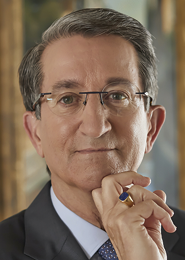- Home
- Media Kit
- Current Issue
- Past Issues
- Ad Specs-Submission
- Ad Print Settings
- Reprints (PDF)
- Photo Specifications (PDF)
- Contact Us
![]()
ONLINE
![]()
ONLINE


Anyone who knows me understands that I love a good, authentic story and have always encouraged others to share their own stories. The power of a personal story, honestly told, builds trust among colleagues, peers, friends and family and drives a greater sense of connection and relevancy.
I would like to begin with a story that I hope will be instructive for everyone who reads this.
It’s a true story about a small boy, all of eight years old, who lost his hearing from an ear infection. For nearly a decade, he was bullied and ridiculed by his peers, even by some family members. His hearing loss was so severe that he failed the 5th grade. During the next decade, he endured no fewer than five experimental surgeries. The last one restored partial hearing in both ears.
When the bandages were removed, the horror of not hearing was replaced by the horror of hearing himself speak. He could not pronounce his R’s or W’s and many viewed him as having a disability. Fortunately for this young boy, his sister-in-law was a speech pathologist at the local university and the boy received the help he so desperately needed. They recorded his speech every day, repeating words and sounds until he could be understood.
However, when the time arrived for college, he was rejected by every school, labeling him disabled with low academic potential. Despite all his efforts, he couldn’t shake the stigma, but the experience taught this young man the meaning of tenacity and to use adversity to build strength. Eventually, he convinced one college that the label of “disabled” was neither appropriate nor fair. He entered the class of 1975 and four years later graduated summa cum laude.
Despite being voted “The Most Likely Not to Succeed” by his high school classmates, this boy went on to become a successful business executive and a global healthcare activist.
That young boy was me!
That experience, fraught with personal challenges, disappointment and ultimately, success, taught me the value of possessing empathy and expressing compassion for others, particularly in the workforce. As a long tenured CEO, I have operated my companies on the belief that you can – and must – serve a double line. Or, to paraphrase Benjamin Franklin, you can do well while doing good. As shared in my first book, Life’s Bulldozer Moments, taking an approach that is collegial, welcoming the input and advice of others, and leading by example are prerequisites to success in life and business.
Humanity, tenderness and compassion for others must exist in the workplace and perhaps more importantly, beyond the workplace. I practiced this philosophy as a CEO and now live it every day through my two nonprofit organizations – the Tramuto Foundation, which provides grants to nonprofits across the country, in addition to annual scholarships over the past 19 years, and Health eVillages, an organization that provides medical professionals in some of the poorest and most remote regions of the globe with up-to-date mobile medical technology.
As a philanthropist and one who has experienced the effects of bullying, I believe deeply in the value of compassionate leadership, so much so that I am currently writing the manuscript for my second book, Profiles in Compassionate Leadership.
Now, more than any time in my life, I believe the factors that make the difference between a good and a better leader – in business and in life – are compassion and empathy toward others. In business, this ability helps you understand the needs of a key client, build and manage an effective management team and deal with the best interest of all your employees and customers. Particularly during these troubling times when there are more questions than answers and many families are one paycheck away from catastrophe, people crave strong, decisive and compassionate leaders who truly hear them, empathize with their plight and create meaningful change.
I implore you to remain open to the reality that as tough as these days are, things will get better. The pandemic will end, our discussions around racial injustice will continue, and, in time, the challenges we are currently confronting may bring about a more inclusive and compassionate society.
I would like to add two important bits of advice: be authentic and be kind. Too many people will tell you what to be and I have found it’s a lot easier to simply be who you are – your happiness will rise and fall on how successfully you lead an authentic life. And please, be kind. I like to say kindness is the new currency for the world in which we live. I encourage you to use that currency in all that you do. There is no other investment that offers a better return.
